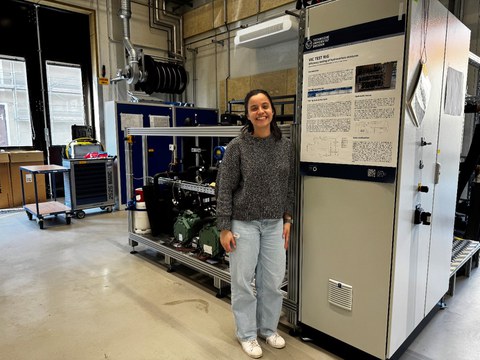25.03.2025
Gastwissenschaftler
These past six months, I was a visiting researcher at the Schaufler Chair of Refrigeration, Cryogenics and Compressor Technology, supported by a research grant from the Deutscher Akademischer Austauschdienst (DAAD). I am originally from Carolina, Puerto Rico, and moved to Minneola, Florida when I was six. I’m currently pursuing my Ph.D. in mechanical engineering at Purdue University in the USA, where my research focuses on two-phase flow dynamics in passive thermosyphon thermal systems. During my six-month research stay in Dresden, I focused on optimizing hydrocarbon mixtures in multi-source heat pumps, an area that is becoming increasingly important for sustainable heating and cooling technologies.
Heating and cooling of commercial and residential buildings account for up to 40% of global energy consumption and contribute significantly to greenhouse gas emissions. Recent EU regulations are phasing out high global warming potential refrigerants, making the transition to environmentally friendly alternatives urgent. While heat pumps offer an energy efficient alternative to conventional heating methods, finding an ideal refrigerant remains a major challenge. During my time at TU-Dresden, I worked alongside Michael Wördemann, Dr. Christiane Thomas, and their team to validate the feasibility of using refrigerant mixtures in multi-source heat pumps across different performance classes.
At Purdue University, my research focuses on the fundamentals of two-phase flow dynamics in passive thermosyphons for data center cooling. In contrast, my work in Germany provided a broader system-level perspective, applying thermodynamic principles to optimize refrigerant performance in real-world heat pump systems.
My research journey has been deeply shaped by international collaboration. I became interested in the research at TU-Dresden after attending the International Refrigeration and Compressors Summer School in 2022, where I learned about their work on heat pump technology. However, this was not my first international research experience. As an undergraduate aerospace engineering student at the University of Central Florida, I spent a summer as a researcher at the Deutsches Zentrum für Luft und Raumfahrt (DLR) through the National Science Foundation’s International Research Experience for Students program. This experience reinforced my appreciation for global scientific cooperation and its role in tackling complex engineering challenges.
My passion for energy efficiency, sustainability, and international collaboration in engineering research has always been influenced by my diverse background. My experience at TU Dresden underscored for me the importance of cross-border cooperation in tackling global energy challenges and developing the next generation of eco-friendly thermal management systems.

